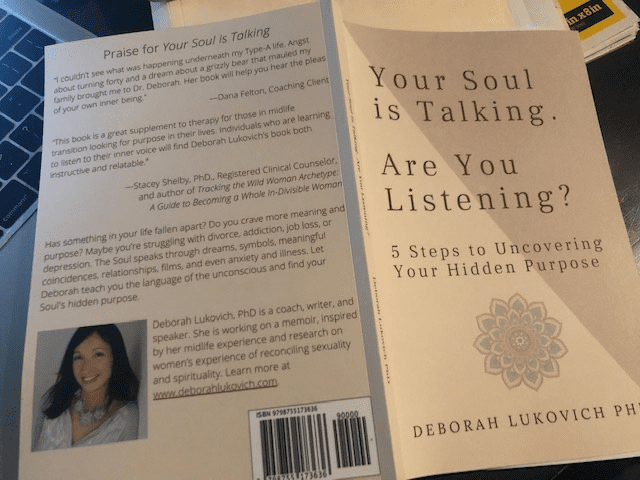In the Midst of Chaos, Find the Myth
First, don’t forget to follow me on Instagram and share this post if you like it.
Second, check out my new podcast, Dose of Depth.
Onto this week’s post:
There’s a purpose to things falling apart. You might not see it–the bigger thing that’s trying to emerge–but it’s there. The personal is also never just personal. Your unique experience of everything happens within the collective and contributes to larger movements of belief and action.


Once I stopped resisting the falling apart of my marriage, all sorts of things became clearer, things that had nothing to do with my husband. I had to let go of that relationship to grow psychologically and spiritually.
You can look at the collective in the same way. The systems in which we live–or are trapped–stop working after a while. The falling apart phase is chaotic and causes suffering, but these systems must fall apart for something more evolved to emerge.
In fact, evolution can’t happen without chaos, and new expressions of old ideas like love, pleasure, social justice, and compassion, happen on the edges of chaos. I don’t think we know why certain people get swept up by the emergence of the new versions of the old, but that saying by Margaret Mead seems relevant, “Never doubt that a small group of thoughtful, committed citizens can change the world; indeed, it’s the only thing that ever has.” These brave souls shoulder a lot for the rest of us, especially because we don’t always understand the end game.
It’s How You Fall Apart That Matters
How you look at falling apart is key to finding meaning and purposes personally and as a member of the collective. The specific pieces of our personal lives or the larger systems under which we live are not random, rather they relate to personal and universal human needs which are non-negotiable aspects of the human experience.
These universal (archetypal) needs, drives, and instincts are core ideas that seek to be expressed in new ways. It’s like the basic story is old, but the way it wants to be experienced is new, but we don’t really have the new script yet. It’s being written through new experiences that rub convention the wrong way.
In my new book, Your Soul is Talking. Are You Listening? 5 Steps to Uncovering Your Hidden Purpose, I introduce you to a framework for discovering the larger story or stories that might be seeking expression through your life experiences.
Excerpts from Chapter 22–
The Archetype Behind Your Complex
Ready to Get Swept Up?
Getting swept up in archetypal energy takes your breath away, and the psychological Growth that can occur during such an experience may reflect something new emerging from the collective unconscious. The 1980s was a time of explosions of new visions of what it meant to be a woman. From the film Thelma and Louise (Scott & Gitlin, 1991) to the real-life stories of violence against women on the newly launched cable network Lifetime, to record numbers of women holding political office, and the resulting Violence Against Women Act, something exploded from what was beneath the surface of conventional society.
The unleashed new perspective resulted from momentum caused by increasing numbers of women and men who became vessels through which the archetypal energies of the feminine and masculine mixed. Eventually, there were enough new individual manifestations to coalesce into larger expansive cultural movements and attitudes about the masculine and feminine, as well as about men and women.
It is not always a positive experience, especially for those who do not have the capacity for self-reflection. Some can unwittingly become vessels for destructive expressions of archetypal energy.
An Archetypal Approach
James Hillman, the father of archetypal psychology, prioritizes Soul-making over treatment for those things we refer to as mental health issues. Hillman offers the Greek myths as a framework for relating to archetypal energies, because Western thought grew out of ancient Greek society. The Greek gods and goddesses can serve as vehicles for personifying the personalities within our psyche, which show themselves through intense emotions and symptoms like Anxiety and Depression. Beware though, I find the myths sometimes to be trapped in a limiting patriarchal lens, and other world myths could work better depending on your ancestry. For me, superhero films feel like updated Greek and Roman Myths.
Hillman’s framework is outlined in his book Re-visioning Psychology (1992), and includes four components: (1) personifying, (2) pathologizing or falling apart, (3) psychologizing or seeing through, and (4) Soul-making. I describe them in my own words and through the lens of my personal experience with this approach.
Which Archetypes Are
Seeking Expression Through You?
As you get closer to the core of your personal complex, you may find yourself swept up in archetypal energies. This is a perfect opportunity to explore which Greek god or goddess might be seeking expression through your life experience. Has Dionysus descended upon you when you were trying to hold yourself together during a time of uncertainty? This Greek god represents fruitfulness, vegetation, wine, and ecstasy. On more than one occasion, during my midlife reconstruction, one extra glass of wine or a shot of Fireball would lead to the desire to kiss a stranger or put on a pair of sunglasses in a bar and dance for hours. Embarrassment would come the next day and then forgiveness for my harmless expression of pent-up desire.


In this section, I touch on some of the Greek gods and goddesses that were helpful in exploring the forces in which I found myself swept up. I mentioned before that many of these myths have been trapped in the masculine, but they are useful ways to explore the forces that can overtake us from time to time. The Greek Goddess Aphrodite isn’t about women, rather she embodies the focus on relationship that exists in all human beings.
The Greek Goddess Artemis is a great example of what a healthy balance of the masculine and feminine might look like. The Myth of the Sacred Prostitute reflects the experience of the union of sexuality and spirituality—symbolically (the role of the prostitute can be played by the feminine within a man). I weave in my experiences of relating to these mythic characters and stories to help you find your own.
Personifying intense emotional experiences as characters provides distance between you and your experience. Imagining that this part of you as someone else helps you to relate to the unfamiliar part of you that has escaped your unconscious. Your experience is a combination of something universal that is shaped by your unique experience of being human. Ultimately, your experience will add meaning to your life and contribute to humanity’s psychic DNA.
The Greek Goddess Artemis
Artemis my favorite of all the Greek gods and goddesses because she embodies a balance of masculine and feminine traits. Jean Shinoda, author of Goddesses in Everywoman: Powerful Archetypes in Women’s Lives (1984/2014), describes Artemis as the Greek Goddess of the Hunt and of the Moon, Competitor and Sister, and suggests that women (and men) who have a strong sense of Artemis energy are focused and usually identify with, or may be an advocate for, feminist (social justice) issues.
These women (and men) also have sisterly and brotherly Relationships with women and men. Artemis is relationship oriented in an unselfish way, lessening the suffering of women in labor, rescuing her mother and other women from rape (and victims of sexual trafficking), protecting pre-adolescent girls, and even protecting the honor of the feminine.


The story of Actaeon, the hunter who offended Artemis by looking at her naked body without permission, is interesting to me because she does not kill him directly, instead she turns him into what his own hunting dogs would attack as prey. In contrast to interpretation of religious doctrine that leads to blaming women for men’s sexual transgressions (and even being raped), in this story Actaeon is responsible for and suffers the consequence of his lack of respect for Artemis’s sexual nature.
Artemis is independent but she falls in love with Orion, and I find it interesting that Bolen blames Artemis’s overly competitive nature for Orion’s accidental death, when in fact it was her brother’s deceit that tricked her into killing the man, which she related to as friend and lover. For me, this event reflects the threat that women’s friendship and bonding with men represents to patriarchal systems. In my opinion, Artemis’s healthy competitive spirit facilitated a deeper connection with Orion.
The most distinguishing feature of Artemis is that she is a virgin in the sense that she does not require marriage or a man to be fulfilled or whole. She is independent and a protector of women, especially young women who still have that feisty energy, and her female nymphs run free and unhampered by the conventions of society. All these attributes have both a light and dark side, and I can see how Aphrodite complements Artemis to ensure a woman’s (or man’s) sense of independence does not prevent intimate connection.
Try This
Journal about your inner Artemis no matter your gender or nongender. How would you describe your balance of masculine and feminine energies? Did your parents steer you in one direction or another? Did your father work hard to prepare you for financial independence, and/or did your mother project onto you her desire to be the princess saved by the prince?
Are you one of those rare ten percent of women (or men or nongendered people) who have the capacity to adapt to situations by calling on your masculine or feminine when one or the other would be more useful? How would you describe your friendships with those of the opposite gender, or those who are beyond gender? How did those friendships change when you or your friend got married?
Intrigued?


Is your life chaotic right now? Do you feel anxious about how your personal life fits into what’s going on in the larger community? Do you hear a whisper from your Soul or God that there might be a new role for you in all this? My new book, Your Soul is Talking. Are You Listening? 5 Steps to Uncovering Your Hidden Purpose, teaches you how to decode those messages by learning the language of the unconscious. Check it out here on my website and be inspired by my reviews on Amazon.
If you’re ready for more, consider hiring me as your coach. In real time, we will explore the guidance your dreams, anxiety, or personal conflicts are offering you. Click here to send me a note to schedule a FREE 30-minute consultation.
Thank You!
Thank you for reading my writing, listening to my new podcast, and being brave enough to reflect about the larger purpose of your life. Please share with others you believe need my approach to finding renewed meaning and purpose.
Images of Hermaphroditus and Artemis are from www.theoi.com, a fabulous source of information and beautiful images from Greek Mythology.
Originally Published on https://www.deborahlukovich.com/blog/
























